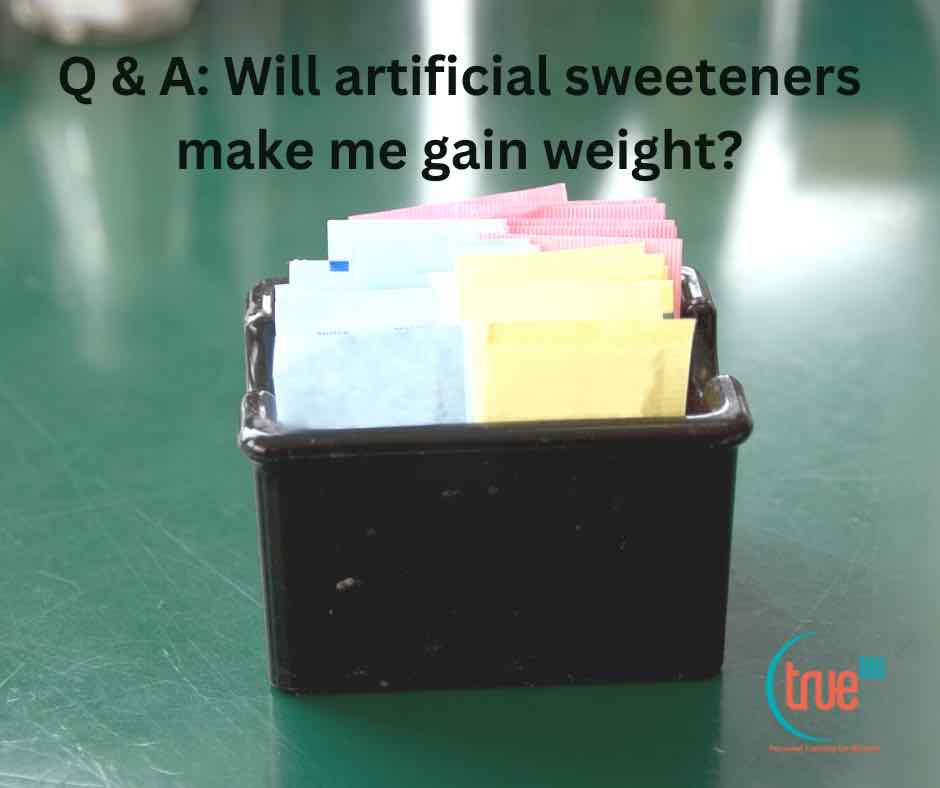Q & A: Will artificial sweeteners make me gain weight?
A: No. How could something devoid of calories cause weight gain? This makes as much sense as putting butter in your coffee while you’re “fasting” because a famous blogger told you this would help you lose weight… drinking a 500 calorie butter latte means you’re no longer fasting (because calories), and adding 500 calories to one’s diet will help nobody lose anything but their sanity. Both of these ideas have been promoted by the same blogger.
What’s the evidence?
The best evidence* we have says replacing full calorie sweeteners with non-calorie artificial sweeteners will yield somewhere between 1 to 5 pounds of weight loss. In humans, and over 11 randomized controlled trials (RTC). Important points:
- These studies were done with humans not rodents.
- This conclusion is from 11 different studies. The means people in different labs at different times and in different countries were able to get the same results. If nobody can repeat your results, then your results are just a fluke.
- These were randomized controlled trials, meaning that who got what was random. In nutrition, the alternative is usually something called a food frequency questionnaire (FFQ).
o An FFQ is where you sincerely ask someone to accurately recall their entire food and beverage intake for the past year. Not making that up. I administered these while studying nutrition at UMD, and when I mentioned that these unreliable I was told I was “unprofessional.”
o From this “data” you calculate this person’s artificial sweetener intake and compare it to their bodyweight. If more of the people in your sample with higher body weights also mentioned higher intakes of artificial sweeteners you then claim that one leads to the other.
- Studies that used water as their “control” were excluded. Water and diet soda have the same number of calories, so you’re not going to see any difference comparing these.
But what about that study?
There is talk of a single rodent study on the internet where artificial sweeteners were “shown” to contribute to weight gain. Before we talk specifics I want to repeat the principle that science must be repeatable. If you’re the only person who can get special results from a particular experiment, this means you are sloppy, unbelievably lucky, and/or a fraud. Let’s get specific-al*:
· “The study” doesn’t seem to have been published, which means that it did not pass the peer review process… in other words their peers called “bullshit” and the researchers couldn’t mount a good defense.
· All I can find are anonymous references to an “Israeli study.”
· The references to the “Israeli study” do not claim that mega doses of artificial sweeteners caused any weigh gain whatsoever. They only claim that ingesting artificial sweeteners changed the ratios of some of the bacteria in the rodents’ poop.
· It’s important to note that everything you eat changes the ratios of the bacteria in your poop. Our intestinal flora are not static, they change with what we eat.
*This is a word I just made up. It is a fancy way to say “specific” because it adds a syllable.
Bottom Line
1-5 pounds is not like hitting the weight loss lottery, but it’s also not nothing, and, it’s also a negative number. Gaining 5 pounds is pretty easy… so, if you tell yourself that this diet soda earns you extra ice cream, well, then that extra ice cream (but not the diet soda) will lead to weight gain. Diet soda + extra ice cream still has fewer calories than extra ice cream + regular soda.
It’s. The. Calories. Don’t let fast talking people on the internet talk you out of basic common sense and logic.

